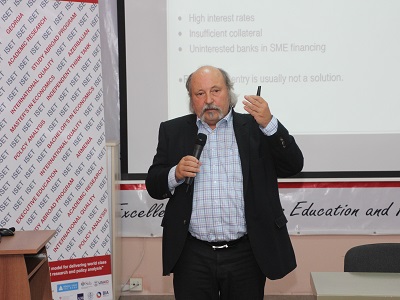ISET Policy Institute presents study on dairy sector
- Details

On October 17, the APRC’s Rati Kochlamazashvili presented the results of a study of Value Added Tax (VAT) Exemption Impact for Increasing the Competitiveness of the Georgian Dairy Sector to dairy sector stakeholders, including farmers, dairy processors and associations, as well as representatives of government bodies and parliament. The presentation took place at the Business Association of Georgia (BAG) and the study was conducted with the financial support from the Land O’Lakes Venture 37 and the United States Department of Agriculture (USDA).
The objective of the study was to estimate the potential impact of VAT exemption on dairy products to increase the competitiveness of the Georgian dairy sector. The study assessed the potential impact of VAT exemption on the state budget, farmers and dairy products’ producers as well as consumers. The research team developed recommendations for VAT exemption policy implementation in order to contribute to the increase in competitiveness of Georgian dairy sector.
ISET hosts Professor of Berlin School of Economics and Law, discusses small & medium enterprises
- Details

Independent entrepreneurship is one of the main drivers of economic development and often manifests itself in the form of small and medium enterprises (SMEs). These start-ups trigger innovation, boost productivity and bring about structural change.
As Prof. Dr. Hansjörg Herr explained, Germany has been able to reap the benefits of this due to a multitude of internal factors. Its local banking system, for instance, is not profit-oriented and consists of savings banks, which is more accessible for entrepreneurs. The country’s vocational education system, too, plays a part, with its split system of teaching both practical skills and theoretical knowledge (in contrast to the more academic education practices of other Western countries). In addition, the government is very supportive of SMEs, as is the government’s development bank, the KfW.










